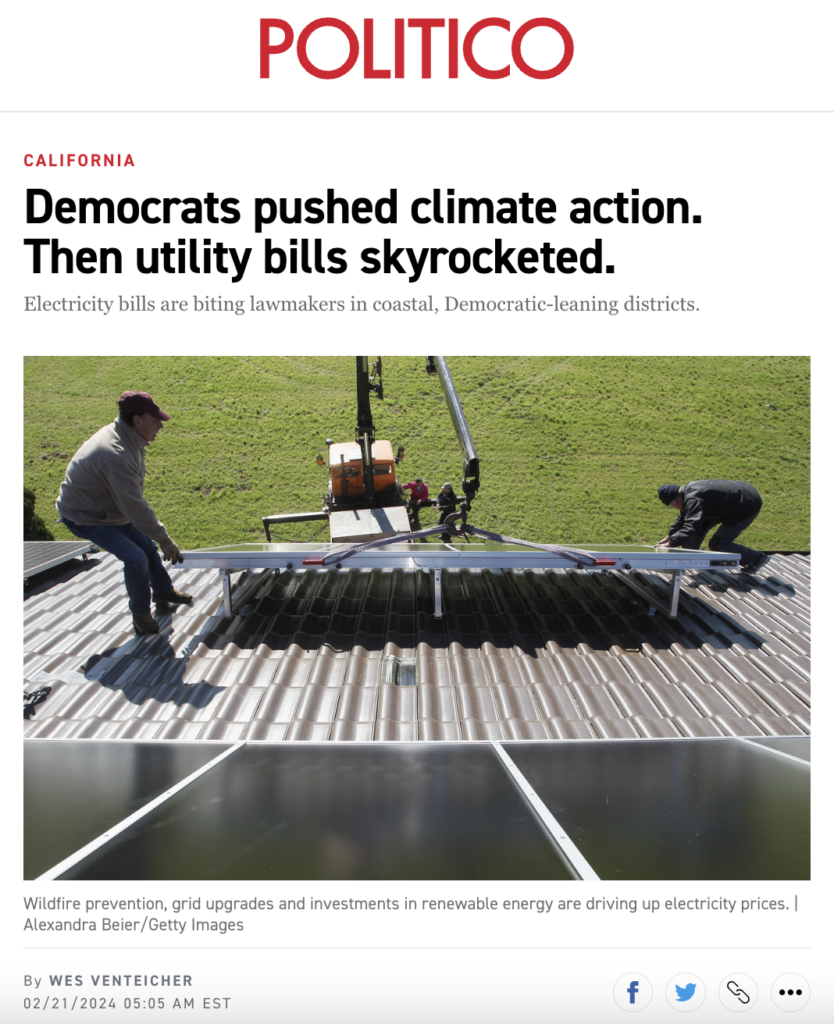https://www.politico.com/news/2024/02/21/democrats-climate-action-utility-bills-00142316
SACRAMENTO, California — California Democrats proudly authored nation-leading clean energy goals that forced the automobile industry to go electric and shaped global climate policy.
Then the bill came due.
There is intensifying political pressure on state lawmakers to do something about utility bills that have shot up by as much as 127 percent over the last decade. Climate spending — from wildfire prevention to building out transmission capacity and paying for renewables — is partly to blame.
Lawmakers there and in other Democratic states with nation-leading climate objectives — like New York and Massachusetts — are scrambling to make their transitions from fossil fuels affordable before they face an all-out ratepayer revolt. The problem is more pressing in an election year when Republicans say Democrats don’t pay enough attention to Californians’ ability to afford the high costs of daily life.
New York lawmakers are also raising concerns about rising utility rates driven by investments in maintaining the gas system and upgrading the grid to accommodate new renewables and increasing electrification.
Last year’s state budget in New York included $200 million to assist households with utility bills. Some Democratic lawmakers are also pushing a measure this session to enshrine into law the state’s policy goal of capping utility costs at 6 percent of income for struggling households.
How lawmakers and energy officials parcel out costs could determine how far transition plans get. It’s pressing, with California aiming for 60 percent renewables by 2030 and New York pursuing 70 percent by then.
“Absolutely high rates can threaten the energy transition, and we should be very concerned,” said Matt Baker, director of the California Public Utilities Commission’s Public Advocates Office. “The energy transition depends on public support, and we have to do whatever we can to maintain that public support. That means doing it in the least-cost manner.”
Baker said the state hasn’t seen rate hikes like these since the 1970s.
California’s largest utility, Pacific Gas and Electric, raised its rates over the winter by an average of about $34 per month, or a 127 percent increase over 10 years. A fifth of its customers are behind on their bills, according to an analysis from Baker’s office. The state’s two other major investor-owned utilities are also seeking increases.
The proposal Democrats voted for two years ago aimed to make electricity bills more equitable by adding a fixed monthly charge that would vary with income, with the wealthiest paying the most.
The charge is intended to make electricity bills more equitable — reducing overall costs for the poorest while keeping monthly bills stable for many middle-income customers, especially those in California’s sun-baked interior who use a lot of air conditioning. And by reducing electricity costs, the change would make it more attractive for everyone to switch to electric cars and appliances.
But the size of the proposed charges, particularly in proposals the utilities submitted to the Public Utilities Commission, created sticker shock. Complications related to income verification also muddled things.
So a group of more than a dozen coastal Democrats held a press conference at the end of January calling for repeal of the proposal, which they said hadn’t received a full vetting when it was introduced as part of a big budget bill at the end of a legislative session in 2022.
California electricity consumer group The Utility Reform Network is shopping around a proposal to cap utility bill increases at the rate of inflation, which would significantly reduce the utilities’ ability to make upfront infrastructure investments.
But the average Californians lawmakers are hearing from don’t know all that, and they’re frustrated, said California state Sen. Steven Bradford, a Democrat who chairs his chamber’s Energy, Utilities and Communications Committee, in a committee hearing last week.
“They don’t care where it comes from, how we got it,” Bradford said. “It’s, ‘Can I afford it?’ And ratepayers, especially working-class people, are paying for most of these aspirational projects that, like you say, are way down the line. And we haven’t even proven that they’re going to pan out and hit our environmental goals.”
#

Politico: California Democrats proudly authored nation-leading clean energy goals that forced the automobile industry to go electric and shaped global climate policy. Then the bill came due. There is intensifying political pressure on state lawmakers to do something about utility bills that have shot up by as much as 127 percent over the last decade. … “Californians are fed up,” said Democratic state Assemblymember Marc Berman at a recent news conference in Sacramento. .. Lawmakers there and in other Democratic states with nation-leading climate objectives — like New York and Massachusetts — are scrambling to make their transitions from fossil fuels affordable before they face an all-out ratepayer revolt. …
“Absolutely high rates can threaten the energy transition, and we should be very concerned,” said Matt Baker, director of the California Public Utilities Commission’s Public Advocates Office. “The energy transition depends on public support, and we have to do whatever we can to maintain that public support. That means doing it in the least-cost manner.” Baker said the state hasn’t seen rate hikes like these since the 1970s. …
California’s largest utility, Pacific Gas and Electric, raised its rates over the winter by an average of about $34 per month, or a 127 percent increase over 10 years. A fifth of its customers are behind on their bills, according to an analysis from Baker’s office. The state’s two other major investor-owned utilities are also seeking increases.



